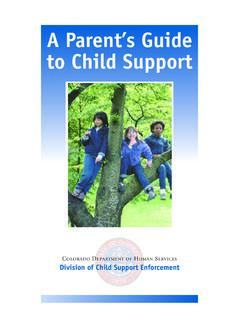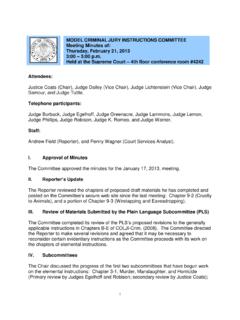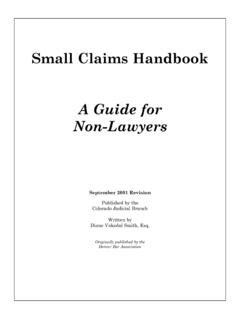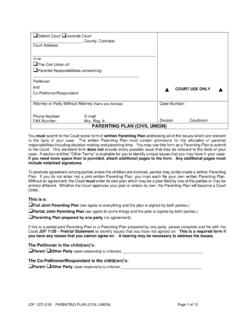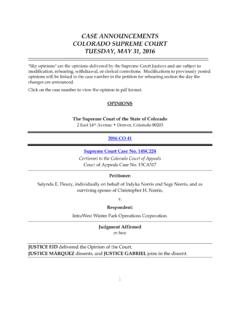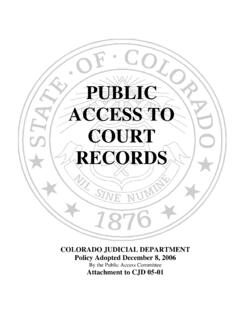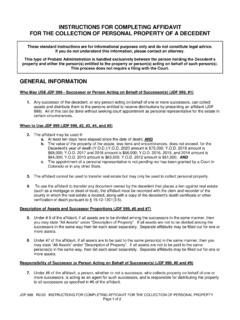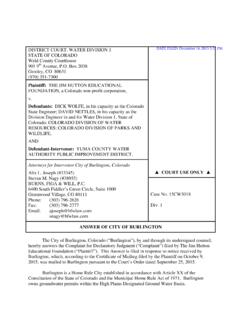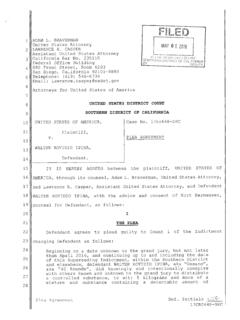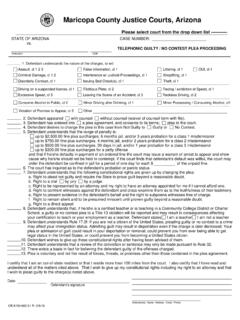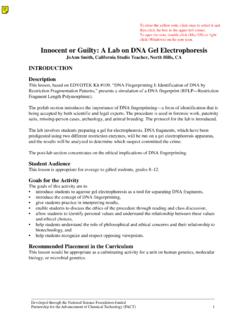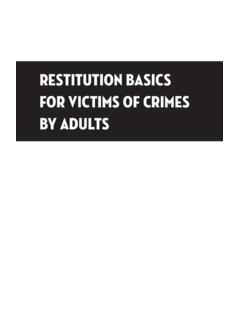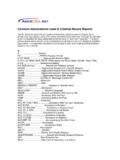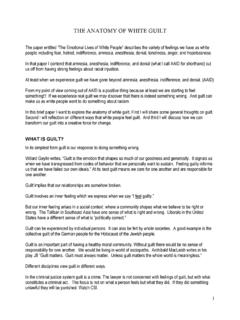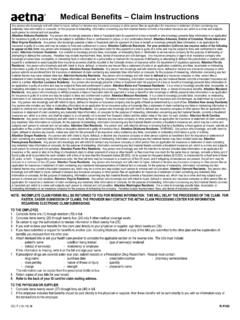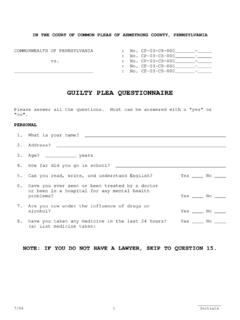Transcription of 2018COA51 No. 14CA1181, People v. Figueroa-Lemus ...
1 SUMMARY April 19, 2018 2018 COA51 No. 14CA1181, People v. Figueroa-Lemus Criminal Procedure Withdrawal of Plea of guilty or Nolo Contendere Deferred Judgment and Sentence A division of the court of appeals concludes that, following Kazadi v. People , 2012 CO 73, 291 16, a defendant may challenge an unrevoked deferred judgment under Crim. P. 32(d). Further, the majority concludes the court has jurisdiction to review a district court s denial of a motion to withdraw a guilty plea when that motion challenged a deferred judgment still in effect. The dissent concludes that the court of appeals lacks jurisdiction to review the denial of a Crim.
2 P. 32(d) motion challenging a deferred judgment that has not been revoked. Considering the merits of the motion to withdraw the guilty plea, the majority concludes that the defendant did not establish a The summaries of the Colorado Court of Appeals published opinions constitute no part of the opinion of the division but have been prepared by the division for the convenience of the reader. The summaries may not be cited or relied upon as they are not the official language of the division. Any discrepancy between the language in the summary and in the opinion should be resolved in favor of the language in the opinion. fair and just reason for withdrawal because his counsel s performance was not deficient.
3 Accordingly, the court affirms the district court s order. COLORADO COURT OF APPEALS 2018 COA51 Court of Appeals No. 14CA1181 Jefferson County District Court No. 12CR2874 Honorable Christie A. Bachmeyer, Judge The People of the State of Colorado, Plaintiff-Appellee, v. Eswin Ariel Figueroa-Lemus , Defendant-Appellant. ORDER AFFIRMED Division I Opinion by JUDGE TAUBMAN Richman, J., concurs Furman, J., dissents Announced April 19, 2018 Cynthia H. Coffman, Attorney General, William G. Kozeliski, Assistant Attorney General, Denver, Colorado, for Plaintiff-Appellee Douglas K. Wilson, Colorado State Public Defender, Mark Evans, Deputy State Public Defender, Denver, Colorado, for Defendant-Appellant 1 1 Defendant, Eswin Ariel Figueroa-Lemus , appeals the district court s order denying his Crim.
4 P. 32(d) motion to withdraw his guilty plea. We first consider whether we have jurisdiction to consider the appeal given that the guilty plea involves a deferred judgment that is still in effect. We conclude that we do because the supreme court in Kazadi v. People , 2012 CO 73, 291 16, expressly provided that a defendant may challenge such a plea under Crim. P. 32(d). Next, we consider the merits and reject Figueroa-Lemus s argument that counsel were constitutionally ineffective for failing to advise him of the immigration consequences of his plea. Accordingly, we affirm the district court s order. I. Background 2 Figueroa-Lemus pleaded guilty to possession of a schedule II controlled substance and driving under the influence (DUI).
5 The parties stipulated to a two-year deferred judgment on the possession count and probation on the DUI count. The court accepted the deferred judgment and sentenced Figueroa-Lemus to two years of probation. 3 About five months later, Figueroa-Lemus filed a Crim. P. 32(d) motion to withdraw his guilty plea to the possession count. He 2 argued that defense counsel (Ed Ferszt) and the immigration attorney Ferszt had him speak with (Samuel Escamilla) were constitutionally ineffective for failing to advise him of the clear immigration consequences of the plea. Specifically, he alleged that counsel failed to investigate, research, and advise him that the plea would (1) result in mandatory deportation; (2) destroy the defense of cancellation of removal; (3) result in mandatory lifetime inadmissibility to the United States; and (4) result in mandatory immigration detention without bond.
6 He also alleged that, if he had been properly advised, it would have been rational for him to reject the plea offer because it gave him no benefit from an immigration perspective. 4 After an evidentiary hearing, the district court denied the motion. 5 Figueroa-Lemus appealed the district court s order denying the Crim. P. 32(d) motion. The People filed a motion to dismiss the appeal, arguing that we do not have jurisdiction to review that order. They contend that the order is not final and appealable because the motion challenged a deferred judgment (a non-final 3 judgment), which had not been revoked when the court entered the order or when Figueroa-Lemus filed the notice of appeal.
7 6 Initially, we announced an opinion based, in part, on a case that had been previously published by a division of this court, People v. Sosa, 2016 COA 92W, 395 1144. We did not discover that Sosa had been withdrawn (due to a reporting error on Westlaw) until the People filed a petition for rehearing. We then withdrew our original opinion and ordered Figueroa-Lemus to respond to the arguments set forth in the People s petition for rehearing. Having reviewed the People s motion to dismiss, the briefs, the People s petition for rehearing, and the response, we issue the following II. Jurisdiction 7 Every court has the authority to decide the question of its own jurisdiction.
8 See In re Water Rights of Elk Dance Colo., LLC, 139 660, 670 (Colo. 2006). As conferred by statute, we have initial appellate jurisdiction over final judgments entered by a district 1 By issuing this opinion, we effectively deny the People s motion to dismiss this appeal and grant, in part, their petition for rehearing. In their petition, the People requested that we withdraw our previous opinion, which we have done. 4 court. See 13-4-102(1), 2017; 1(a)(1). A final judgment is one that ends the particular action in which it is entered, leaving nothing further for the court pronouncing it to do in order to completely determine the rights of the parties involved in the proceedings.
9 People v. Guatney, 214 1049, 1051 (Colo. 2009). In a criminal case, a final judgment is entered when a defendant is acquitted, has the charges dismissed, or is convicted and sentenced. See id. 8 A deferred judgment is not a final judgment. See People v. Carbajal, 198 102, 105 (Colo. 2008). Thus, a deferred judgment may not be subjected to either Crim. P. 35 or direct review while it is still in effect. See Kazadi, 10, 291 at 19. 9 Nevertheless, a defendant may challenge a deferred judgment under Crim. P. 32(d). See id. at 10, 291 at 19-20. In Kazadi, the parties argued for the first time in the supreme court that the defendant should be allowed to pursue a Crim.
10 P. 32(d) motion to withdraw his guilty plea. See id. at 9, 291 at 19. The supreme court agreed, concluding that the rule allows a defendant to move for withdrawal of a guilty plea before sentence is imposed or imposition of sentence is suspended. Id. at 10, 291 5 at 20; cf. People v. Corrales-Castro, 2017 CO 60, 3, 395 778, 779 (concluding that Crim. P. 32(d) did not provide a remedy for a defendant who sought to withdraw his guilty plea after he had completed the terms of the deferred judgment, the plea had been withdrawn, and the case had been dismissed because Crim. P. 32(d) requires that a plea exist in order for it to be withdrawn).
